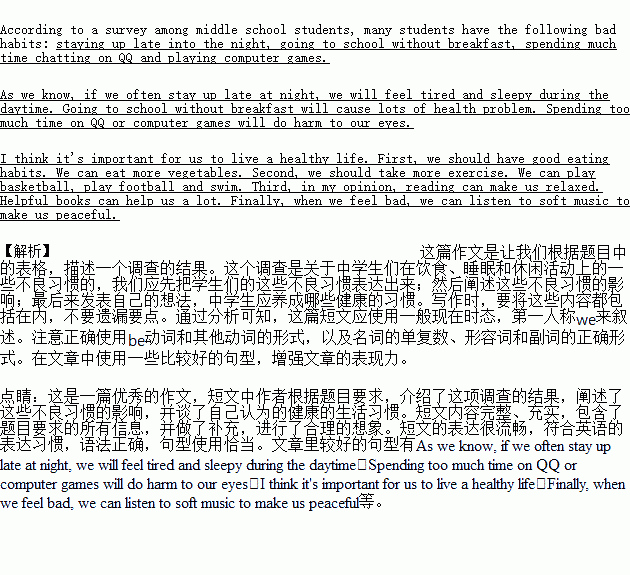��Ŀ����
ѧ��������һ��������ѧ��˯�ߡ���ʳ�����е�����ϰ�ߵĵ��飬����ѧ���в���ϰ�ߡ������������Ϣдһƪ130�������ҵĶ��ġ�Ҫ�������
1������ϰ�ߣ����ϰ�ҹ, ���������ѧ, ��ʱ��������QQ������Ϸ��
2��������Щ��ϰ�߿��ܲ�����Ӱ��......
3��������±���ʾ��дд����Ϊ��ѧ��Ӧ�����Ľ�������ϰ��......
ע��㣺1�����¿�ͷ�Ѿ��������������ܴ�����
2�����в��ܳ�����ʵ������ѧУ���ơ�
A healthy lifestyle | Eating | Good eating habits ... |
Exercising | Different sports... | |
Reading | ... | |
... | ... |
Let��s Develop a Healthy Lifestyle
According to a survey among middle school students, many students have the following bad habits:
���Ķ�������ƪ���£��������ṩ����Ϣ�������Ϣ����
If you lose 12 times, will you just give up? Dale Carnegie, a pioneer in public speaking and self-development, kept trying. And he became famous by showing people how to be successful.
Carnegie was born in 1888 in the central United States. As a son of a farmer, the boy had to get up at 4 a.m. every day to milk the cows. When Carnegie first entered college, he felt hopeless because of his clothes and ordinary (��ͨ��) looks. His mother encouraged him, ��Why not try to be better in other things instead of just dress and good looks?��
Carnegie tried to be more active in college. He joined the debate (����) team. But one after another, he lost 12 times. The young man was so disappointed in himself that he even thought of ending his own life for so many failures.
But soon Carnegie was seen practicing public speaking on the riverside. His hard work brought good results at last. In 1906, Carnegie won a famous speech match and became widely famous.
The young man made his own words come true: ��Believe that you will succeed, and you will.�� In order to share his success, Carnegie started schools and wrote books. More than 50 million copies of his books have been printed in 38 languages. They are still helping people on the road to success.
Information Card
Carnegie��s father��s job | 1.. |
The person who gave Carnegie courage | 2.. |
The group Carnegie joined in college | 3.. |
The place where Carnegie did the practice | 4.. |
The age when Carnegie became famous | 5.. |

